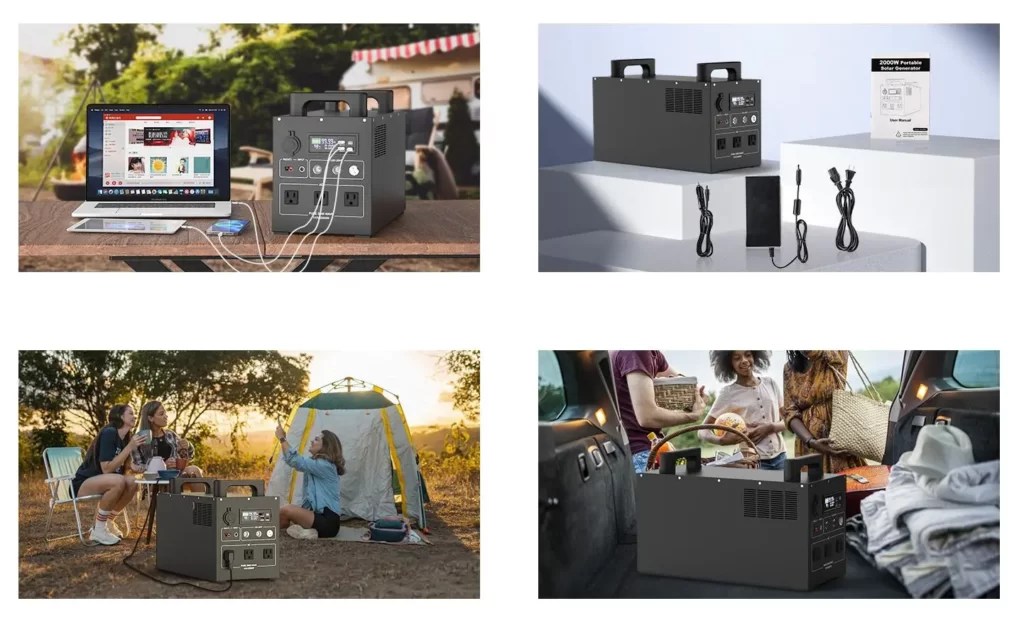
Welcome, my friend! If you’re considering starting a portable power station business in Africa, you’ve come to the right place. In this comprehensive guide, we’ll explore all the essential aspects you need to know to make informed decisions and set yourself up for success. So grab a cup of coffee, sit back, and let’s dive in!
Portable power stations are versatile and reliable energy solutions that provide electricity on the go. These compact devices, also known as solar generators or battery generators, store power for later use. They are particularly valuable in regions with limited access to electricity, making Africa a prime market for this business venture. Now, let’s explore the key factors you should consider.
But before we delve into the nitty-gritty details, let me assure you that understanding the African market and tailoring your approach to its unique characteristics is paramount. So, let’s explore the essential aspects that will guide your journey.
Assessing Power Needs and Demographics

Africa is a diverse continent with varying power needs and demographics. Understanding these factors will help you identify your target market and cater to their specific requirements. Consider the following:
- Power Infrastructure: Start by assessing the state of the power infrastructure in your target regions. Determine the prevalence of unreliable or nonexistent electricity grids, as this will indicate the demand for portable power solutions.
- Demographics and Applications: Study the demographics and lifestyles of the local population. Identify potential customer segments that would benefit from portable power stations, such as outdoor enthusiasts, remote communities, small businesses, and emergency response teams.
- Power Consumption Patterns: Analyze the typical power consumption patterns in the target areas. Consider the appliances and devices commonly used and their power requirements. This knowledge will help you determine the capacity and features your portable power stations should offer.
Selecting the Right Portable Power Station

Choosing the right portable power station is crucial for your business’s success. Here are the key factors to consider when selecting your product offerings:
- Power Capacity: Determine the required power capacity based on your target market’s needs. Consider the average power consumption, duration of use, and the number of devices to be powered simultaneously. Ensure that your portable power stations offer sufficient wattage and storage capacity to meet these demands.
- Battery Type: Portable power stations typically use lithium-ion batteries due to their high energy density, lightweight nature, and long lifespan. Opt for reputable battery brands that offer safety features like overcharge protection and thermal management.
- Charging Options: Consider the charging options that your target market will find most convenient. Portable power stations can be recharged through solar panels, AC outlets, car chargers, or even wind turbines. Offering versatility in charging methods will enhance the appeal of your products.
- AC and DC Outputs: Evaluate the types and number of output ports your portable power stations should have. AC outlets are essential for powering larger appliances, while USB ports and DC outlets are ideal for charging mobile devices and low-power electronics.
- Portability and Durability: African landscapes can be challenging, so ensure that your portable power stations are designed for durability and ease of transport. Look for sturdy construction, ergonomic handles, and compact designs that can withstand rugged environments.
- Safety Features: Prioritize safety features such as surge protection, short-circuit protection, and temperature regulation. This will give your customers peace of mind when using your products.
Top 5 portable power station manufacturers

- Voltagogo: VOltagogo is a renowned manufacturer specializing in portable solar power solutions. They offer a range of portable power stations with various capacities, including the popular Utility series from 250w-3000w, widely used in Africa. Voltagogo’s products are known for their durability, reliability, and integration of solar charging capabilities. They also provide a range of compatible solar panels and accessories.
- Jackery: Jackery is a leading manufacturer of portable power stations and solar panels. They offer a wide selection of compact and lightweight power stations suitable for outdoor adventures, emergency backup, and off-grid living. Jackery’s products are known for their user-friendly design, high-quality lithium batteries, and versatile charging options. They also provide portable power solutions for camping, tailgating, and mobile charging needs.
- Anker: Anker is a well-known brand in the consumer electronics industry, and they also offer a range of portable power stations. Their power stations are compact, lightweight, and packed with features. Anker’s products often include USB-C Power Delivery ports, multiple AC outlets, and various charging options. They are known for their sleek design, fast charging capabilities, and reliable performance.
- EcoFlow: EcoFlow specializes in high-capacity portable power stations suitable for both indoor and outdoor use. Their products, such as the River series, provide ample power for camping, RV living, and emergency situations. EcoFlow’s power stations feature advanced lithium battery technology, fast charging speeds, multiple AC outlets, and smart display systems. They are also known for their durability and compatibility with solar panels.
- Bluetti: Bluetti is a rising player in the portable power station market, offering a range of reliable and efficient products. Their power stations, like the AC200P and EB240, are known for their high capacity, multiple AC outlets, and solar charging compatibility. Bluetti emphasizes eco-friendliness and provides robust power solutions for various applications, including camping, outdoor activities, and backup power.
Here’s a comparison table highlighting some key features and specifications
| Brand | Voltagogo | Other brands |
| Battery Technology | LiFePO4,High ignition point (700-750 ℃), high service life (2000 times), high thermal stability, high safety performance | Lithium-ion Low ignition point (250 ℃), short service life (500 times), weak thermal stability, low safety performance |
| Inverter | High conversion efficiency, high load capacity, high compatibility, continuous upgrade and optimization | Weak load capacity, basically only compatible with resistive loads of the same power, inductive loads of the same power have a certain blind spot, upgrade optimization difficulties |
| Display screen | TFT screen, display parameters rich content, high visibility, more than 100 units can be customized guest LOGO, as the opening interface | LCD or LED screen, display content single, can not be changed, visibility is not high |
| Internal partitions | Two internal compartments, inverter and battery modules are placed separately, fast heat dissipation and high safety performance | Internal not completely isolated, slow heat dissipation, security performance is not high |
| BMS | Smart BMS, built-in CPU, can achieve a variety of functions and control through the control panel, powerful, the use of professional-grade Coulomb meter to accurately calculate the charge and discharge power, the use of low internal resistance MOS tube, less loss, low temperature rise, multi-way temperature probe, more accurate implementation of the battery high and low temperature protection. | less funcions and the protections are not strong |
| Cost | Resonable, cost-effective | high |

To reach your target customers effectively, you need well-established distribution channels and a reliable after-sales support system. Consider the following strategies:
- Local Partnerships: Collaborate with local businesses, retailers, and distributors who have established networks and knowledge of the market. This will help you navigate regulatory challenges, language barriers, and logistical complexities.
- E-commerce Platforms: Leverage online platforms and marketplaces to expand your reach across Africa. Develop a user-friendly website and establish partnerships with popular e-commerce platforms for seamless product distribution.
- Training and Technical Support: Provide comprehensive training materials and resources to your distributors and customers. Offer technical support channels to address any queries or issues that may arise during product usage.
- Warranty and Repair Services: Offer reliable warranty policies and efficient repair services to build trust with your customers. This will enhance your brand reputation and customer loyalty.
Government Regulations and Incentives
Navigating the regulatory landscape is vital when operating a business in Africa. Research the specific regulations, certifications, and import/export requirements related to portable power stations in each target country. Additionally, explore potential government incentives or subsidies that promote renewable energy solutions and facilitate market entry.
Marketing and Educating the Market

Marketing and education play a crucial role in the success of your business. Implement the following strategies to raise awareness and generate demand:
- Localized Marketing Campaigns: Tailor your marketing efforts to the cultural nuances and preferences of each target market. Utilize local languages, imagery, and storytelling to effectively communicate the benefits of portable power stations.
- Demonstrations and Workshops: Organize product demonstrations, workshops, and community outreach programs to showcase the value of portable power solutions. Engage with potential customers, answer their questions, and address any concerns they may have.
- Online Content and Influencers: Leverage social media platforms, blogs, and online influencers to amplify your brand’s reach. Create engaging content that educates and empowers your target audience, positioning your brand as a trusted source of information.
Conclusion:
Congratulations! You’ve now gained a comprehensive understanding of what it takes to start a portable power station business in Africa. By assessing power needs, selecting the right products, establishing distribution channels, complying with regulations, and implementing effective marketing strategies, you’re well-equipped to embark on this exciting entrepreneurial journey. Remember, providing reliable, sustainable, and accessible power solutions can positively impact communities and businesses throughout Africa. Now, go out there and make a difference!
Remember, my friend, starting a business is not without its challenges, but with careful planning, market research, and a customer-centric approach, you can create a successful venture that contributes to Africa’s energy revolution. Best of luck on your entrepreneurial journey!




